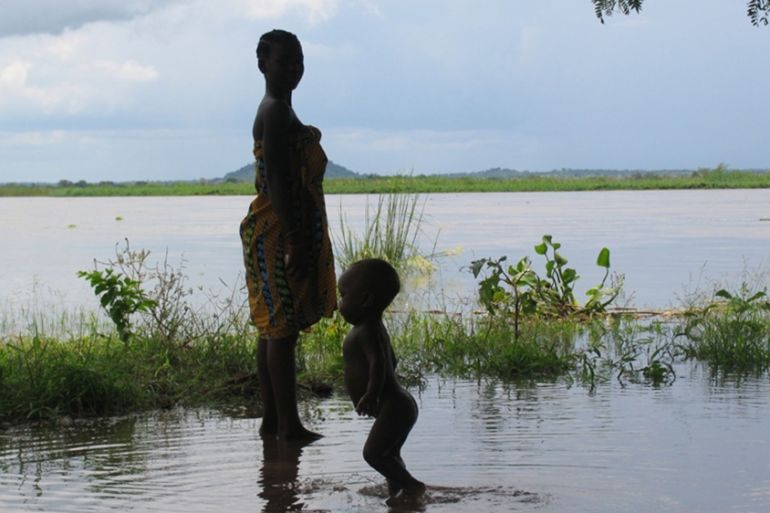Mozambique loosens anti-abortion laws
Attempting to lower maternal deaths, southern African country revised its penal code to allow some abortions.

Maputo, Mozambique – To abort an unwanted pregnancy, some women drink bleach or home-brewed mixtures made with livestock manure. Others insert a twig or chicken bone into their uterus or rub their vagina with herbal elixirs to induce early childbirth.
Or they jump from a high place.
Keep reading
list of 4 items‘We share with rats’: Neglect, empty promises for S African hostel-dwellers
Thirty years waiting for a house: South Africa’s ‘backyard’ dwellers
Photos: Malnutrition threatens future Afghan generations
When abortions are illegal, they are often carried out in the back rooms of doctors, traditional healers or druggists – and can be painful and dangerous. Thousands of women die each year as a result.
The problem is severe in developing countries, especially in Africa. But recently the southern African nation of Mozambique decided to allow some types of abortion in an attempt to reduce high rates of maternal deaths during pregnancy and childbirth.
Last month outgoing President Armando Guebuza signed a revised version of the penal code into law, permitting some types of abortion. Under the provision women can now terminate a pregnancy until the 12th week of pregnancy. Extraordinary circumstances, such as rape or threats to the mother’s life, can permit abortion until the 16th week.
Rosa, a small and lanky woman in her 30s who lives near the coastal town of Xai-Xai, was 16 years old when she became pregnant. The boy who impregnated her left and because single mothers are not accepted in her community, she went to a traditional healer to abort the pregnancy. The next day she became unwell and was brought to a health clinic.
In many countries, prohibitions prevent women from seeking assistance by health professionals... If it's not allowed, women expose themselves to great risks by using their own, unsafe methods.
“Those who don’t live close to a doctor die of the complications,” Rosa said, adding she was aware of the risks before she saw the healer.
Ivone Zilhao, a doctor in Maputo, Mozambique’s capital, has lobbied for years for liberalisation of the country’s abortion law.
“Women that don’t want a child are willing to go to their own death,” she said. “Under the new provision, women have the possibility to terminate a pregnancy safely and without deadly risks.”
‘A new approach’
Mozambique’s abortion ban originated in colonial times, when predominantly Catholic Portuguese ruled the country. As in many other nations in southern Africa, religion continues to play an important role in Mozambique in debates over social issues such as abortion.
Accordingly, Zilhao and her allies chose to focus not on women’s rights, instead framing access to legal abortions as a matter of public health. Safe abortions are five times cheaper for the country’s medical system than illegal abortions, Zilhao said – and Mozambique suffers from a high rate of maternal deaths during pregnancy and childbirth.
“It’s time to take a new approach,” she said.
Zilhao estimated about 11 percent of all maternal deaths in Mozambique are caused by unsafe abortions, and about 29,000 women in Africa are believed to die each year as a result of the roughly 6.2 million unsafe abortions carried out on the continent.
The World Health Organisation defines an unsafe abortion as the termination of an unwanted pregnancy either by “persons lacking the necessary skills or an environment lacking minimal medical standards, or both”.
WHO estimates that 98 percent of unsafe abortions take place in developing countries. Health officials argue the number of maternal deaths in developing nations would decrease if governments loosen restrictions on abortion.
“In many countries, prohibitions prevent women from seeking assistance by health professionals,” said Ute Stallmeister of DSW, an international advocacy organisation focusing on sexual and reproductive health and rights. “If it’s not allowed women expose themselves to great risks by using their own, unsafe methods.”
While legislation has a huge impact on the number of illegal abortions, few countries have liberal laws or provide access to safe abortion facilities, according to Stallmeister. In Africa, only South Africa, Cape Verde and Tunisia have liberal abortion laws.
South Africa legalised abortion in 1996 and the number of deaths caused by unsafe abortions subsequently dropped by 91 percent between 1998 and 2001, compared to 1994 figures, medical researchers found.
Legal reforms: not enough?
However, revising laws is only a first step, say both Zilhao and Stallmeister. Doctors and medical personnel still have to be trained in the procedure, for instance, and medical facilities need the appropriate equipment.
Moreover, they argue the underlying causes of unwanted pregnancies must also be addressed – which Stallmeister said are often the result of a lack of access to safe and effective family planning.
Domestic violence, rape, child marriage, and more generally the position of women in traditional societies are among the other causes, Zilhao told Al Jazeera. “The aim should be to abolish unwanted pregnancies and therewith the need for abortion.”
Rosa, the Mozambiqan woman who had an abortion, said the stigmatisation of women who have abortions also needs to be addressed. She now supports girls and women in the rural parts of Mozambique’s Gaza province, noting many are afraid to ask for help.
“Some people believe in ‘African myths,'” Rosa said, explaining some people refuse to be served food by women who had an abortion. “They believe such a woman does not only want to kill her child, but also other people. Of course that’s absurd.”
Benjamin Durr reported from Mozambique as part of the International Reporting Project